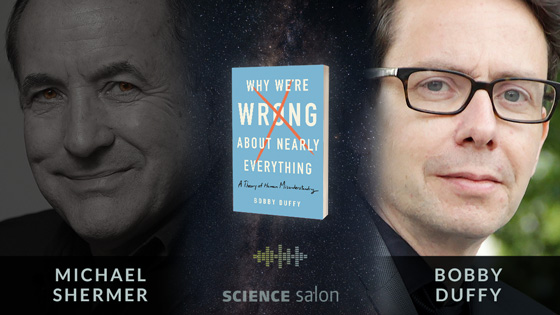SCIENCE SALON # 99
Michael Shermer with Bobby Duffy — Why We’re Wrong About Nearly Everything: A Theory of Human Misunderstanding
What percentage of the population are immigrants? How bad is unemployment? How much sex do people have? These questions are important and interesting, but most of us get the answers wrong. Research shows that people often wildly misunderstand the state of the world, regardless of age, sex, or education. And though the internet brings us unprecedented access to information, there’s little evidence we’re any better informed because of it. We may blame cognitive bias or fake news, but neither tells the complete story. In Why We’re Wrong About Nearly Everything, Bobby Duffy draws on his research into public perception across more than forty countries, offering a sweeping account of the stubborn problem of human delusion: how society breeds it, why it will never go away, and what our misperceptions say about what we really believe. We won’t always know the facts, but they still matter. Why We’re Wrong About Nearly Everything is mandatory reading for anyone interested making humankind a little bit smarter. Duffy and Shermer also discuss:
- cognitive biases and how they distort what we think about the world
- do men really have more sexual partners than women (and if so, who are they having sex with?)
- why we lie to ourselves and others about almost everything
- fears about immigrants and immigration
- Brexit: leave or remain and why people vote each way
- why we are more polarized politically than ever before (and what we can do about it)
- the “backfire effect”: the bad news and the good
- why we are not living in a post-truth era
- why facts matter and why free speech matters, and
- kids these days…
Bobby Duffy is director of the Policy Institute at King’s College London. Formerly, he was managing director of the Ipsos MORI Social Research Institute and global director of the Ipsos Social Research Institute. He lives in London.
Listen to the podcast via Apple Podcasts, Spotify, Google Podcasts, Stitcher, iHeartRadio, and TuneIn.
Check Us Out On YouTube.
Science Salon • Skeptic Presents • All Videos
You play a vital part in our commitment to promote science and reason. If you enjoy the Science Salon Podcast, please show your support by making a donation.
THE GREAT COURSES PLUS
Get One Free Month Using Michael Shermer’s Special Discount Link Below
We are now working with The Great Courses to bring you a special offer for Unlimited Access to Over 11,000 Video and Audio Lectures in Science, Math, History, Photography, and more… Read the following note from Michael Shermer to learn more.
As most of you know I consume a lot of online content while I’m driving, cycling, hiking, or doing chores around the house, and for years you’ve heard or seen me posting on social media The Great Courses I’ve been taking, for example:
- Professor Patrick Grim’s The Philosopher’s Toolkit: How to be the Most Rational Person in Any Room.
- Professor Richard B. Spence’s The Real History of Secret Societies, and
- Professor Daniel Breyer’s Understanding the Dark Side of Human Nature.
In the past I would purchase individual courses, but with The Great Courses Plus program you can subscribe to the service and listen to individual lectures — or entire courses — from a huge variety of courses from their catalogue.
With The Great Courses Plus program I often skip around and listen to lectures from different courses, depending on what, exactly, I’m interested in hearing that particular day. For example, The Philosopher’s Toolkit includes 24 30-minute lectures that teach you, for example, how to think like Artistotle, the power of thought experiments, the difference between cool rationality and hot thought, why we make mistakes, how to win debates, and near and dear to my heart, how to think scientifically.
For a limited time only, they are offering my listeners an entire month for free.
But to start your free month trial, you must sign up today using my special promotional URL: thegreatcoursesplus.com/salon

Fluoridation of public water sources remains controversial as a public health measure despite the strong evidence that fluoride prevents tooth decay. Harriet Hall, M.D. examines the evidence and the arguments for and against water fluoridation to see what holds up to scrutiny. This article appeared in Skeptic magazine 24.4 (2019).
Water Fluoridation
Public Health, Not Poison
I think we can all agree that “Look, Mom—no cavities!” is good news. But we continue to disagree about the best way to achieve that. Fluoridation of public water sources remains controversial as a public health measure despite the strong evidence that fluoride prevents tooth decay. Public debates can become quite heated, with one side praising water fluoridation as an essential preventive and the other side demonizing it as coerced ingestion of a poison. Recently fluoridation has faced new accusations that it lowers IQ. Which side is right? Let’s see how the evidence and the arguments on each side hold up to scrutiny.
Optimal Level of Fluoride in Drinking Water
The natural fluoride content of drinking water varies widely by geographic location. Studies have shown that people whose water is low in fluoride are more likely to develop cavities. If the fluoride content is too high, they can develop fluorosis, with tooth discoloration and other problems. The EPA has set maximum levels of fluoride at 2 ppm to prevent enamel fluorosis and 4 ppm to prevent skeletal fluorosis. The World Health Organization has set the recommended maximum level at 1.5 ppm.
In 2015, the U.S. Department of Health and Human Services updated the optimal fluoride level in drinking water to 0.7 mg of fluoride per liter of water (equivalent to 0.7 parts per million or ppm). This was based on extensive research and consideration of other sources of fluoride. If the natural fluoride content of drinking water is lower than 0.7 ppm, water fluoridation can raise it to 0.7. If it is over the recommended maximum level, there are ways to lower it. Estonia had levels as high as 7 ppm (10 times the optimum), and they were able to successfully lower the fluoride exposure of their citizens by using reverse osmosis technology and drilling new wells. Fluorosis should not occur at currently recommended levels of water fluoridation.
Fluoride Reduces Cavities
Fluoride is the key to preventing and controlling tooth decay. A clear scientific consensus: the evidence shows fluoride is effective, both at the individual and at the community level. Individual measures include taking fluoride supplements and getting various professional fluoride treatments by dentists. Community measures include water fluoridation, educational programs, and fortification of foods such as table salt. Few people would deny that fluoride is effective; the disagreements are about how fluoride should be supplied. […]












